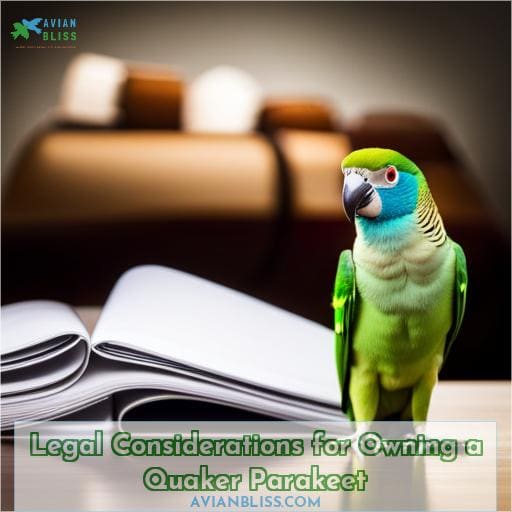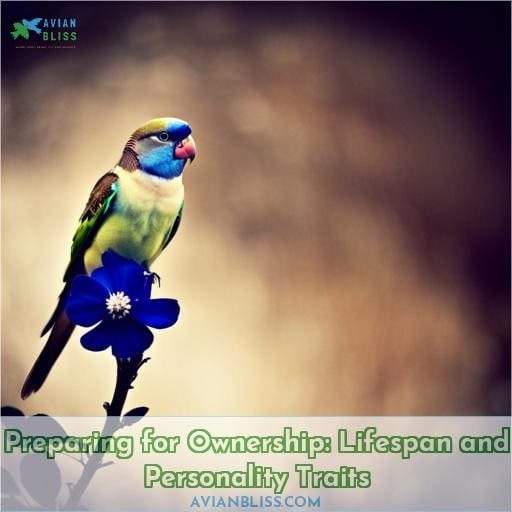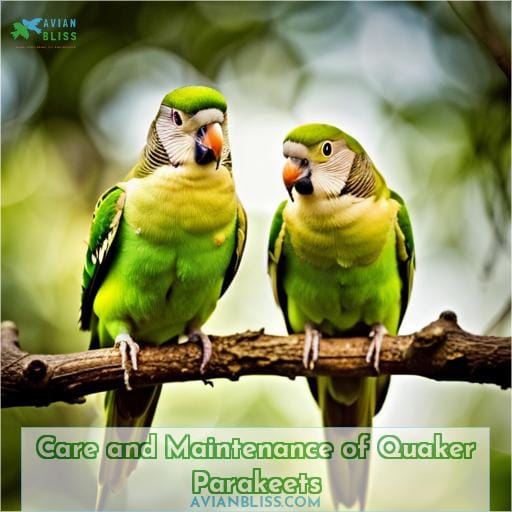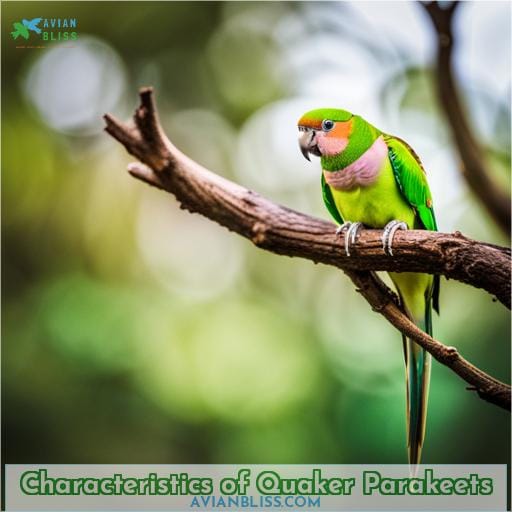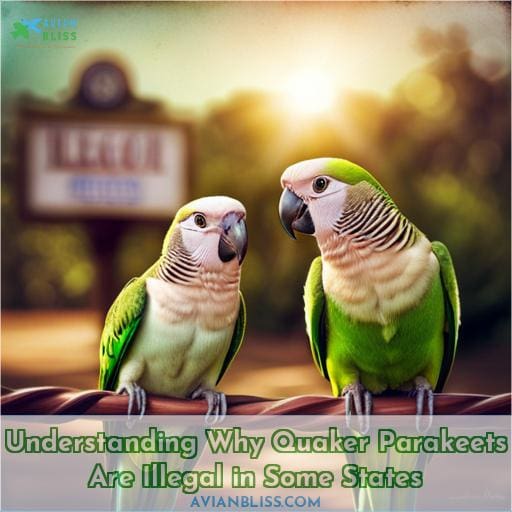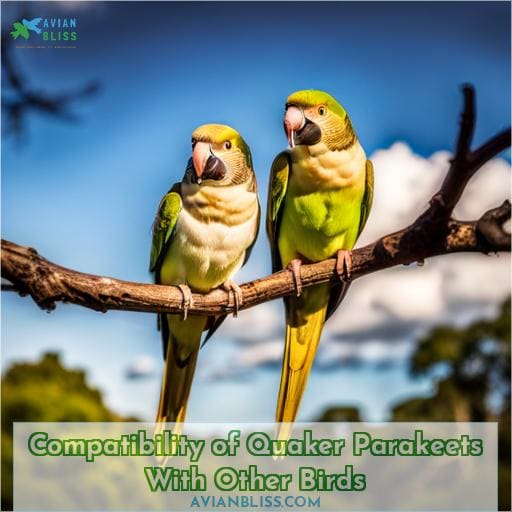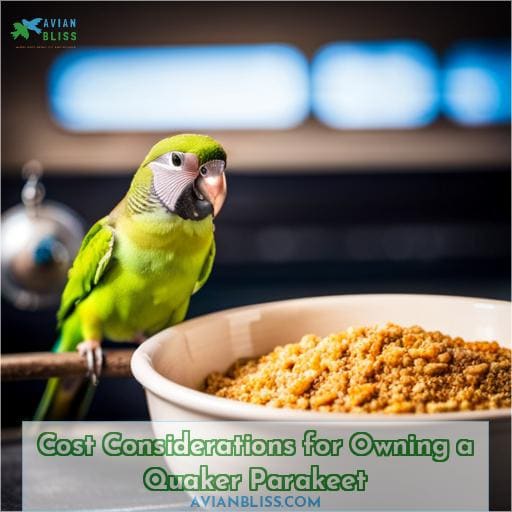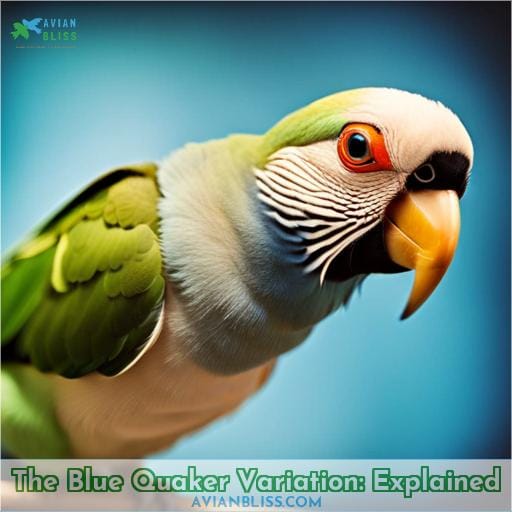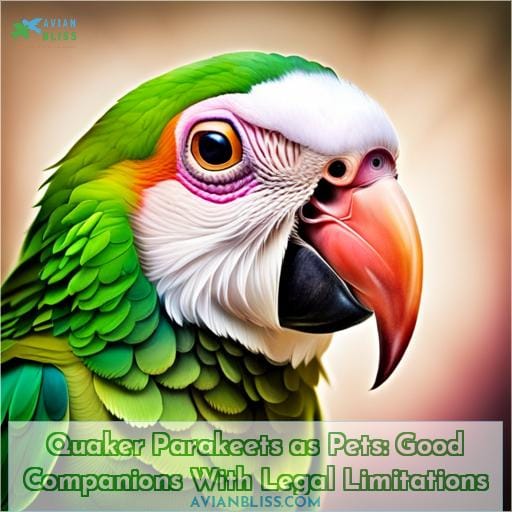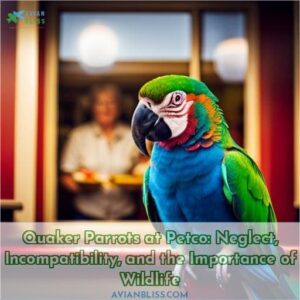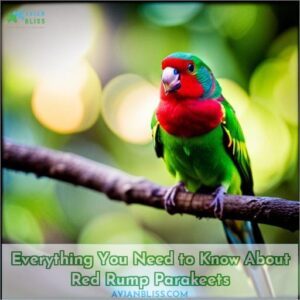This site is supported by our readers. We may earn a commission, at no cost to you, if you purchase through links.
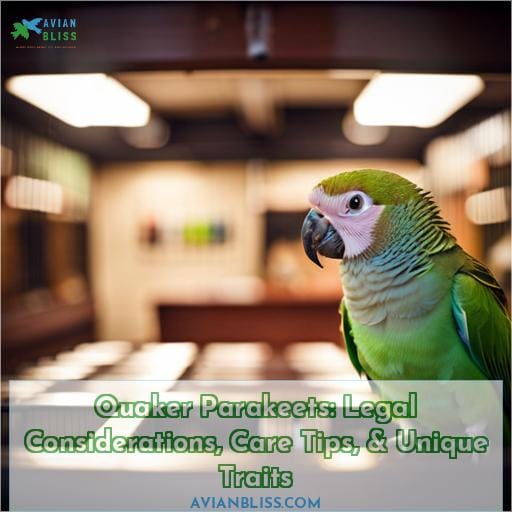 Imagine bringing home a Quaker parakeet, a delightful and intelligent companion that will brighten your days with its vibrant plumage and playful antics. But before you dive into the world of owning these charming birds, there are important legal considerations to keep in mind.
Imagine bringing home a Quaker parakeet, a delightful and intelligent companion that will brighten your days with its vibrant plumage and playful antics. But before you dive into the world of owning these charming birds, there are important legal considerations to keep in mind.
From state legality to cage requirements and dietary needs, this article will provide you with essential information on caring for Quaker parakeets while ensuring compliance with local regulations.
Table Of Contents
- Key Takeaways
- Legal Considerations for Owning a Quaker Parakeet
- Preparing for Ownership: Lifespan and Personality Traits
- Care and Maintenance of Quaker Parakeets
- Characteristics of Quaker Parakeets
- Understanding Why Quaker Parakeets Are Illegal in Some States
- Compatibility of Quaker Parakeets With Other Birds
- Cost Considerations for Owning a Quaker Parakeet
- The Blue Quaker Variation: Explained
- Quaker Parakeets as Pets: Good Companions With Legal Limitations
- Frequently Asked Questions (FAQs)
- Conclusion
Key Takeaways
- Quaker Parakeets require long-term commitment and responsibility due to their lifespan of 20-30 years.
- Proper socialization from an early age can help prevent aggression in Quaker Parakeets.
- Providing a spacious cage, a variety of foods, and mental stimulation is essential for the well-being of Quaker Parakeets.
- Quaker Parakeets are illegal in certain states due to legal ramifications, ecological impact, and their potential as invasive species.
Legal Considerations for Owning a Quaker Parakeet
Before bringing a Quaker Parakeet into your home, it’s essential to understand the legal considerations involved.
The legality of owning a Quaker Parakeet varies by state, and it’s crucial to check if they’re allowed in your area.
Some states prohibit ownership of these birds, including California, Connecticut, Georgia, Hawaii, Kentucky Pennsylvania Rhode Island Tennessee Wyoming Maine.
It’s important to be aware that authorities may intervene if you own a Quaker in one of these prohibited states and euthanasia could be a potential consequence.
State legality and consequences
If you’re considering owning a Quaker Parakeet, it’s important to be aware of the legal considerations and potential consequences in your state.
Some states have restrictions or bans on Quakers, such as California, Connecticut, Georgia, Hawaii, Kentucky, Pennsylvania, Rhode Island, Tennessee, Wyoming, and Maine.
The ownership of these birds in prohibited states can lead to legal repercussions and even euthanasia for the bird.
Make sure you understand the laws regarding quaker legality before bringing one into your home.
Lifespan and commitment
When considering the legal ownership of a Quaker Parakeet, it’s important to understand the lifespan and commitment required for these beloved avian companions.
- Lifespan planning: Quakers have a lifespan of 20-30 years, so be prepared for long-term care.
- Socialization strategies: Proper socialization helps prevent aggression in these birds.
- Long-term commitment: Owning a Quaker requires dedication and responsibility due to their lengthy lifespans.
Cage and diet requirements
To properly care for a Quaker Parakeet, you need to provide a spacious cage and monitor their dietary needs.
Cage enrichment is crucial for their mental stimulation, so be sure to include behavioral toys and perches.
For their diet, offer a variety of foods such as pellets, dark green vegetables, fruits, eggs, and cheese in moderation.
| Cage Enrichment | Dietary Variety | Socialization Tips |
|---|---|---|
| Behavioral toys | Pellets | Bonding time |
| Perches | Veggies | Positive rewards |
Preparing for Ownership: Lifespan and Personality Traits
As you prepare to own a Quaker Parakeet, it’s essential to understand their lifespan and unique personality traits.
Quaker parakeets have a long lifespan of 20-30 years, so owning one requires a significant long-term commitment.
These birds form strong bonds with their owners and thrive on socialization, making it crucial for them to receive plenty of attention and interaction.
Understanding the personality traits of Quakers is important as well because they can exhibit aggression if not properly socialized or if they feel threatened.
It’s important to provide mental stimulation through toys and activities to keep them engaged and prevent any behavioral issues from arising.
Remember that owning a Quaker Parakeet isn’t suitable for short-term ownership as they may outlive other pets in your household.
By considering these factors, you’ll be better prepared for the responsibilities that come with owning this intelligent and charismatic bird species.
Care and Maintenance of Quaker Parakeets
When it comes to caring for Quaker Parakeets, there are a few important considerations.
First and foremost is providing them with a spacious cage that allows for plenty of movement and socialization.
Additionally, their dietary needs should consist mainly of pellets, supplemented with occasional fruits and vegetables while keeping an eye on fatty seed intake.
It’s crucial to provide fresh food and water daily to ensure they’ve a healthy diet, as well as mental stimulation through toys and activities to keep their intelligent minds engaged.
Cage Considerations
To properly care for your Quaker Parakeet, it’s important to consider the appropriate cage size and setup.
Provide spacious living quarters that allow room for social interaction.
Include enriching toys and chewable accessories to keep your bird mentally stimulated.
Carefully consider cage placement for optimal comfort and safety.
Dietary Needs
For optimal health and nutrition, Quaker Parakeets require a balanced diet consisting of a variety of pellets, fruits, and vegetables.
Pellets offer nutritional consistency compared to seeds.
Fresh food should be managed by removing uneaten produce promptly.
Hydration practices are crucial for their well-being, while providing calcium-rich cuttlebones promotes good beak health.
Fresh Food and Water Daily
Ensure your Quaker Parakeet’s health and well-being by providing:
- Fresh food and water daily.
- A variety of vegetables, fruits, and hard-cooked eggs for dietary diversity.
- Good hygiene by washing the water dish daily to prevent bacterial growth.
- Monitoring stool consistency for proper digestion management.
- Calcium supplements for beak health.
Mental Stimulation
Keep your Quaker Parakeet mentally stimulated by providing a variety of toys and activities.
Enrichment toys, interactive play sessions, puzzle feeders, training games, and exposure to environmental stimuli are all essential for their mental well-being.
Make sure to engage them regularly to promote a happy and healthy bird.
Characteristics of Quaker Parakeets
Quaker Parakeets are known for their hardy attitude, making them adaptable to various climates.
As chewers, they require plenty of toys and healthy treats to keep their minds stimulated.
With their intelligence and talking ability, some Quakers can learn words and phrases, adding an interactive element to your relationship with them.
Additionally, it’s important to note that Quaker Parakeets have unique behaviors such as quaking and shaking which are normal for this species.
Hardy Attitude
Quaker Parakeets exhibit a hardy attitude, making them resilient and adaptable companions for bird owners. Their robust survivability allows them to thrive in various climates, showcasing their environmental adaptability and climate tolerance.
With behavioral toughness, Quakers prove to be enduring pets with unique traits that make them intriguing companions.
Chewers
To understand the unique traits of Quaker Parakeets, it’s important to recognize that they’re natural chewers.
Chewers’ dilemmas can be solved by providing enriching chew toys and training them to focus their chewing behavior on appropriate items.
Chew-proof accessories can also help protect your belongings from their curious beaks.
Intelligence and Talking Ability
When it comes to their intelligence and talking ability, Quaker Parakeets are known for their impressive skills in mimicking human speech.
With dedicated intelligence development and speech training, these charming birds can learn words and phrases with ease.
Their exceptional communication skills showcase the unique learning patterns of this bird species.
Unique Behaviors
One interesting aspect of Quaker Parakeets is their unique behaviors that set them apart from other parrot species.
They’re known for their quaking behavior, playful antics, and vocal mimicry.
Social interactions and environmental enrichment play a significant role in shaping their behavior.
Understanding Why Quaker Parakeets Are Illegal in Some States
If you’re considering owning a Quaker Parakeet, it’s important to understand why these birds are illegal in some states. Legal ramifications and ecological impact play significant roles in state legislation regarding Quaker Parakeets.
One concern is their potential as invasive species, which can disrupt local ecosystems and harm native bird populations. Additionally, nesting complications arise when Quakers build large communal nests on utility poles or transformers, posing risks of electrical fires or power outages.
Managing the population of this species becomes challenging due to their adaptability and prolific breeding habits. However, conservation efforts focus on habitat protection for other endangered bird species rather than promoting the presence of non-native birds like Quakers in certain areas.
The goal is to strike a balance between preserving biodiversity while minimizing environmental impact caused by introduced species like the quaker parakeet.
Compatibility of Quaker Parakeets With Other Birds
If you have other birds and are considering adding a Quaker Parakeet to your flock, it’s important to understand the compatibility of Quaker Parakeets with different bird species.
Quaker Parakeets are known for their sociable nature and ability to form strong bonds with both human owners and avian companions. They thrive in environments that provide avian companionship, as they enjoy interspecies interaction and social dynamics within a mixed species flock.
However, introducing a new bird into an existing flock requires careful observation of behavioral adaptation and habitat cohabitation. It’s essential to ensure that all birds involved feel safe, secure, and comfortable in their shared living space.
Monitoring interactions between the Quaker Parakeet(s) and other birds will help identify any signs of aggression or discomfort early on so that appropriate measures can be taken for harmonious coexistence among feathered friends.
Cost Considerations for Owning a Quaker Parakeet
When considering the cost of owning a Quaker Parakeet, it’s important to factor in the expenses associated with their diet.
While pellets provide balanced nutrition and are easier to regulate than seeds, they may be more costly.
Additionally, ensuring proper hydration through fresh water maintenance is crucial for your bird’s health but can also contribute to ongoing expenses.
Cost of pellets vs. seeds
When considering the cost of owning a Quaker Parakeet, it’s important to weigh the expenses associated with providing pellets versus seeds for their diet.
Pellets offer a nutritional comparison advantage over seeds, as they provide balanced nutrients and easier regulation. Additionally, pellets contribute to better digestive health and reduce the risk of obesity compared to a seed-based diet.
While seeds may be cheaper initially, investing in pellets can have long-term health implications that outweigh any short-term cost differences.
Nutritional diversity and supplementation
To ensure optimal health for your Quaker Parakeet, provide nutritional diversity and supplementation in their diet.
Nutritional balance promotes digestive health and overall well-being.
Supplements can be effective in meeting specific nutrient needs.
Handle fresh food carefully to maintain its freshness and prevent spoilage.
Hydration is of utmost importance, so make sure your bird has access to fresh water daily.
Remember that a varied diet plays a crucial role in extending the lifespan of your beloved Quaker Parakeet.
Hydration and water maintenance
To ensure proper hydration and water maintenance for your Quaker Parakeet, it’s essential to provide fresh water daily.
- Maintain water dish hygiene by washing and rinsing it thoroughly each day.
- Prevent bacterial growth by practicing good dish hygiene.
- Consider incorporating nutritional supplements through sprinkling them on the food rather than adding them to the water.
The Blue Quaker Variation: Explained
If you’re curious about the Blue Quaker variation, here’s an explanation.
The Blue Quaker is a color variation of the common quaker parakeet (Myiopsitta monachus). It isn’t a separate species but rather a genetic mutation that affects the bird’s feather pigmentation. Instead of the traditional green plumage, Blue Quakers have feathers with shades ranging from light blue to dark cobalt blue.
Blue Quakers are highly sought after by avian enthusiasts due to their unique appearance and striking aesthetics. Their beautiful blue feathers make them stand out among other quaker parakeets, adding an element of rarity and charm to any collection.
Breeding considerations must be taken into account when trying to produce Blue Quakers as it requires specific knowledge of genetics and careful selection of breeding pairs. Popularity trends for these birds have fluctuated over time, but they continue to be in high demand among dedicated breeders and pet owners who appreciate their distinct beauty.
Whether you’re considering owning or breeding Blue Quakers, understanding their genetics and color variations can help you make informed decisions regarding care, conservation efforts, or simply appreciating these stunning avian companions.
Quaker Parakeets as Pets: Good Companions With Legal Limitations
Now that you understand the unique blue variation of Quaker Parakeets, let’s delve into their potential as pets and the legal limitations surrounding ownership.
Quaker Parakeets can make excellent companions with their charming personalities and ability to form strong bonds with their owners. However, it’s important to be aware of the legal considerations before bringing one into your home.
Firstly, keep in mind that owning a Quaker Parakeet requires a significant lifespan commitment as they can live for 20-30 years. This means being prepared for long-term care and providing them with proper attention throughout their lives.
Quakers also have distinct traits such as intelligence and talking ability, making them engaging companions. They thrive on mental stimulation provided through toys and activities tailored to meet their needs.
While they don’t require frequent bathing like some other bird species do, regular access to water for drinking is essential. Additionally, offering occasional opportunities for bathing may help maintain healthy plumage.
Lastly but most importantly, when considering a pet parrot like the Quaker Parakeet remember that laws regarding ownership vary by state; ensure legality before acquiring one so you can enjoy all these unique traits while adhering to local regulations.
Frequently Asked Questions (FAQs)
Can Quaker Parakeets be trained to do tricks?
Quaker Parakeets can indeed be trained to do tricks!
With patience, positive reinforcement, and consistent training methods, you can teach your feathered friend a variety of engaging and entertaining tricks.
Enjoy the journey together!
What is the lifespan of a Quaker Parakeet?
Ah, the lifespan of a Quaker Parakeet, a topic that has kept many bird enthusiasts on the edge of their perches.
On average, these vibrant creatures can grace your life for 20-30 glorious years.
Are Quaker Parakeets noisy birds?
Quaker Parakeets are known for their vocal nature, emitting a range of sounds from chirps to squawks. While some find their calls charming, others may consider them noisy. Proper training and socialization can help mitigate excessive noise levels in these intelligent birds.
Can Quaker Parakeets live in outdoor aviaries?
Yes, Quaker Parakeets can live in outdoor aviaries. However, it’s important to ensure their safety and protection from predators.
Providing shelter, proper ventilation, and monitoring environmental conditions are essential for their well-being.
How often should Quaker Parakeets be taken to the vet for check-ups?
Ensure your Quaker Parakeet’s well-being with regular check-ups at the vet.
As a responsible owner, aim for annual visits to monitor their health, address any concerns promptly, and ensure they live a long and happy life.
Conclusion
In summary, owning a Quaker parakeet requires careful consideration of legal regulations, proper care, and understanding of their unique traits.
These vibrant and intelligent birds can bring joy and companionship to your life, but it’s crucial to ensure compliance with state laws and provide them with the right cage and diet.
With their long lifespan and playful personalities, Quaker parakeets require dedication and commitment. By understanding their needs and providing them with a stimulating environment, you can enjoy a fulfilling journey of Quaker parakeet ownership.

